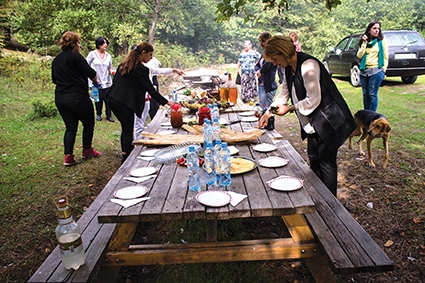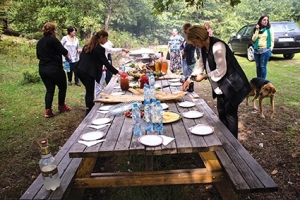Ecotourism: Georgia’s Forestry Potential Underestimated
Georgia’s potential to be a top destination for nature and ecotourism is being under-prioritized.
The forestry sectors in other countries plays a huge role in developing such tourism, and Georgia should be no exception– 40 percent of Georgia’s land is covered by extremely rich forest which can be utilized for greater profit than mere domestic purposes. Creating recreational areas will contribute to the effective management of forest zones and increase socio-economic development.
Georgia’s forests are generally managed by the National Forestry Agency, a LEPL under the Ministry of Environment and Natural Resources Protection. Unfortunately, the agency has little experience with recreational forest management and, therefore, has yet to implement much activity in this direction.
However, the country does have a better example of forestry management capability in the Agency of Protected Areas of Georgia, which has demonstrated great success over the past 10 years of operating recreational forests. About 75 percent of the Protected Areas in Georgia is covered by forest, and management is an essential part of the administration duties.
For centuries, the usage of forest resources has been associated with timber acquisition. Firewood, agricultural or commercial production of timber has been an intense process, which still continues today. Such practice has seen negative effects in many developed countries where large areas of forest were destroyed. 95 percent of forests in Europe are an example of this destructive practice, resulting in altered landscapes and falling numbers of forest fauna. Consequently, the recreational value of such forests drops significantly.
In recent years, the tendency to use forests for recreation and tourism purposes is gaining in popularity. Today’s overly busy and stressful lifestyle creates a demand for recreational areas which allow urban residents to get closer to nature, relax and unwind. Additionally, the creation of recreational spaces contributes to the quality of living, opens employment opportunities, improves the health of the local population and plays its part in the country’s economic development.
One fine example of such a recreational area already up and running in Georgia is “Sviana,” located in Stori Valley in the Telavi Municipality of Kakheti region. The importance of the area is significant because the valley is characterized by rugged terrain and rich biodiversity. In addition, a 30 km road runs along the valley, the only road leading to the Tusheti Protected Areas, which is generally packed with tourists from May to September.
The pilot initiative to reinforce the recreational possibilities of the River Stori ravine is being implemented with the financial support of the Austrian Development Cooperation, in partnership with CENN (the Caucasus Environmental NGO Network), within the scope of the project Sustainable Forest Governance in Georgia.
The Women’s Committee of Pshavi village, established by CENN in 2010, aims to make the Pshavi women more active in natural resource management and to develop the economy of the village itself. Today, there are 10 members in the Committee. The village’s proximity to Sviana and the Stori Valley led CENN to give full management of the area to them, along with the opportunity to create tourist services and generate their own income.
According to Natia Saakashvili, the Sviana Development Project Coordinator, the recreation area already has seven movable and two static tables, with four grills for barbeques. The Committee plans to set up open stands to enable locals to sell various items, such as locally made tone bread, cheeses and handmade souvenirs typical to the region. “Additionally, we will have a children’s playground for family visits and a camping area for backpackers,” she says, adding that the personnel serving in the area will have a branded uniform to raise the awareness among visitors.
To reduce the impact on the environment and reduce the use of plastic single-use utensils, the Committee plans to offer multi-use kitchen utensils for rent. And all the profit that comes from the Sviana recreational area will be used by the Committee to strengthen it and the village itself.
The pace of urban development and rapidly growing city populations is generating a new wave in the tourism sector – ecotourism. This should be taken as a sign for the need to maintain forests and to give them another purpose besides timber production for the generation of revenue. Take Sviana as a good example.
Baia Dzagnidze











